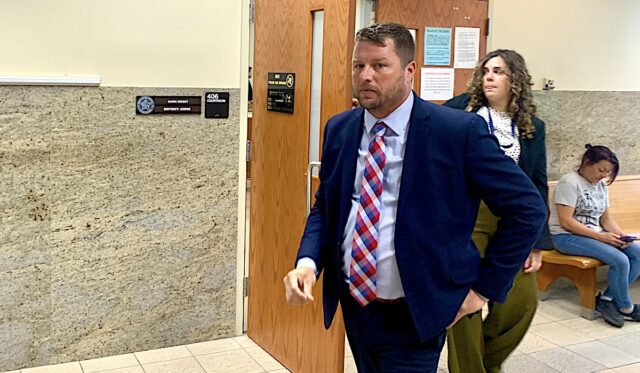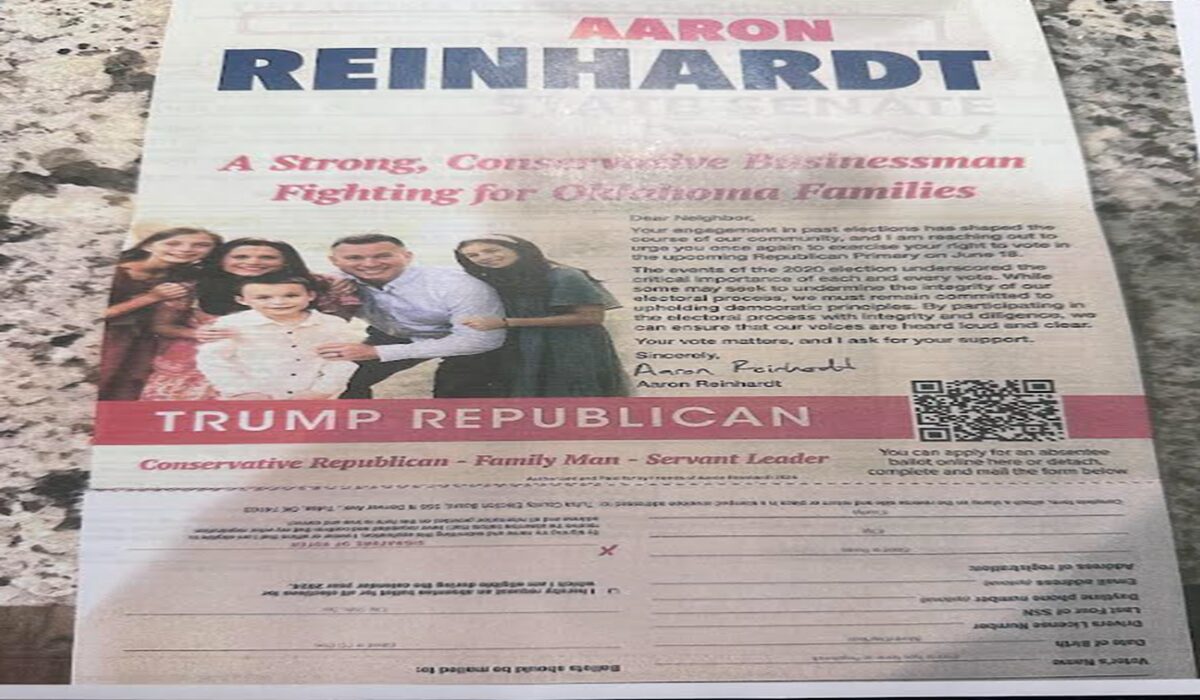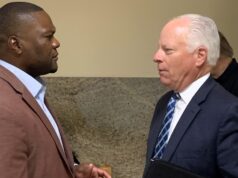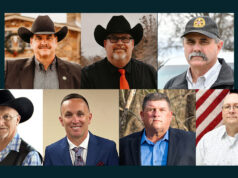
After a false start at a hearing this morning that caused a minor delay, Tulsa County District Court Judge David Guten dismissed Sen. Cody Rogers’ challenge to the June 18 primary election results that spelled his defeat. While Rogers alleged that his opponent, Aaron Reinhardt, had engaged in “ballot harvesting,” Guten called the claim “frivolous” during a short afternoon hearing.
“The court finds the petition fails to show irregularities,” Guten ruled orally before telling the parties he would finalize a written order done by the end of the day.
While three of the four legislative incumbents who lost their primary elections last week prepared for their unplanned retirements from political office, Rogers (R-Tulsa) filed a contest to the election results of Senate District 37 alleging misconduct by Reinhardt’s campaign.
Requesting that the election results be overturned, Rogers’ petition alleged that Reinhardt violated state law prohibiting “ballot harvesting” by distributing a mailer on official campaign letterhead that contained forms with which voters could request absentee ballots.
When the campaign dust settled the night of June 18, Reinhardt (2,102 votes) had narrowly defeated Rogers (2,017 votes) in the election, 51.03 percent to 48.97 percent. Rogers filed an election contestation with Paul Ziriax, the secretary of the Oklahoma State Election Board.
On Friday, Ziriax ordered that Rogers’ allegations be scheduled for a hearing in Tulsa County District Court. The hearing was set for 9 a.m. Tuesday and assigned to Presiding Judge Dana Moody, but after it commenced, Moody offered to recuse from the case because she said her husband, Chad Moody, had donated to Reinhardt’s campaign.
After a brief recess, Rogers and his attorney officially requested Moody’s recusal, and the case was reassigned to Guten.
“I apologize to both individuals in this matter,” Moody said.
Complicating matters Tuesday was that, when the presiding judge is unable to hear an election challenge, the court’s prior presiding judge is supposed to hear the case. However, Judge Doug Drummond was out of town on vacation, which left the matter to Guten, who is set to become the next presiding judge in Tulsa County.
After Guten ruled, Reinhardt praised the hearing’s result and mentioned his opponent.
“I’m obviously thankful for the judge and for the court for the thoroughness of this. Glad to be putting this behind us. I’m thankful for the people who came out and voted,” Reinhardt said. “It was a hard-fought election. I hope for closure for him and his family, and we’re ready to focus on the general election.”
Asked whether he regretted sending the mailer in question, Reinhardt declined to discuss Rogers’ allegations.
“I don’t even want to respond to that,” said Reinhardt, an insurance agent and guidance counselor at Metro Christian Academy. “There were so many mailers in this race.”
Rogers said he was displeased with the hearing’s results and indicated he would appeal to the Oklahoma Supreme Court.
“We didn’t even get to argue our case,” Rogers said. “The decision was already made by the court before we even got in there. I hope with that we challenge it at the Supreme Court.”
Rogers had faced his own claims of electoral irregularity during the SD 37 primary, receiving a letter from Attorney General Gentner Drummond directing him to file updated reports with the Oklahoma Ethics Commission after a pre-primary report showed no outside fundraising, a $250,000 personal loan and no campaign expenditures, despite Rogers’ signs and mailers being prevalent in the community.
While Reinhardt and his campaign cried foul, Rogers and his team suggested that Drummond was doing a favor for Reinhardt’s political consultants: Campaign Advocacy Management Professionals. Drummond’s chief of staff, Trebor Worthen, was a longtime business partner of CAMP founding partner Fount Holland, and a separate former CAMP associate also works for Drummond’s office.
Rogers, who owns a road construction business, had originally hired CAMP to run his 2024 campaign for Tulsa County commissioner, but he eventually decided to seek reelection to SD 37 after realizing his business would not be able to pursue Tulsa County contracts if he were a commissioner charged with approving those decisions.
With CAMP already representing Reinhardt in SD 37, Rogers returned to using Tomahawk Strategies, which he had employed for his 2020 election that drew a libel lawsuit for misattributing legal matters to the wrong Chris Emerson on mailers. After an appeal in the case, a settlement was reached, and Rogers distributed a new mailer acknowledging the mistaken identity.
Despite Drummond’s direction for Rogers to update his 2024 pre-primary report to reflect campaign expenditures, no additional filings appear on Rogers’ campaign committee page with the Ethics Commission.
Reinhardt is set to face independent Aaron Nutter in the Nov. 5 general election.
Rogers faces ‘mathematical certainty’ standard
If he appeals Tuesday’s district court decision, Rogers will still face a high bar to challenge the election successfully. Under state law, a court must rule that it is impossible to determine the valid winner with “mathematical certainty.”
In his petition, Rogers alleged “thousands of irregularities involving absentee ballot harvesting in Tulsa County,” although he acknowledged later in an addendum that only 277 absentee ballots were requested in the SD 37 race. Of those 277 requested, only 143 were returned.
With the SD 37 Republican primary decided by only 85 votes, Rogers could reach that bar if he can convince a court that all absentee votes were potentially tainted by Reinhardt’s mailer. However, courts in Oklahoma presume the validity of elections unless compelling evidence is presented otherwise.
Reinhardt’s attorneys argued that Rogers could not show the SD 37 primary results were indeterminable with “mathematical certainty” because only 73 of the 143 absentee ballots cast were for Reinhardt. Even if all absentee ballots were struck, Reinhardt would still win the election.
Chase McBride, Rogers’ attorney, made the case that when Reinhardt’s 73 absentee votes were combined with 23 additional Election Day votes by voters who were sent absentee ballots then there were enough ballots in question to demonstrate “mathematical uncertainty.”
In another line of argument, McBride said that if the case went to the discovery phase, he would know how many voters received the mailer in question before emphasizing “all absentee voters that received the mailer are cast into doubt,” even voters who ultimately voted for Rogers.
Guten was unswayed and dismissed Rogers’ complaint.
Reinhardt accused of violating 2022 ‘ballot harvesting’ law

In Oklahoma, “ballot harvesting” is a fairly new term that was first defined in statute in 2020. That year, an unprecedented increase in the casting of absentee ballots caused by the COVID-19 pandemic resulted in renewed attention on absentee voting procedures across the country.
A debate over who should legally be able to return absentee ballots quickly turned into national camps either criticizing “ballot harvesting” or defending “ballot collecting.” Whether you call it “harvesting” or “collecting,” the debate typically centers on whether (and to what extent) third-parties like campaigns or political parties should be able to gather absentee ballots from voters and return them in bulk to county election boards.
Critics argue that ballot harvesting creates the potential for fraud, while proponents argue that ballot collecting increases turnout amongst elderly voters, disabled voters and voters in remote communities.
In Oklahoma, a bill criminalizing six practices as ballot harvesting became law in 2020. Title 26, Section 14-101.1 of state statute initially defined ballot harvesting as:
- “Collecting or obtaining an absentee ballot from another person with the intent to submit, transmit or return the ballot to election officials on behalf of that person”;
- “submitting, returning or transmitting an absentee ballot to election officials on behalf of another person”;
- “collecting or obtaining an absentee ballot from another person under a false pretense or promise of transmitting, returning or submitting it to election officials on behalf of that person”‘
- “requesting or receiving an absentee ballot on behalf of another person;”
- “partially or fully completing an application for an absentee ballot on behalf of another person without that person’s prior consent; or”
- “notarizing or witnessing more absentee ballots than allowed by law.”
In its original form, Oklahoma’s ballot harvesting law would not have included Reinhardt’s mailers, but an amendment passed in 2022 — for which Rogers voted — added an additional form of ballot harvesting: “distributing an absentee ballot request application or request to a voter using the official letterhead of a candidate or elected official.”
Under the 2022 amendment, the Reinhardt mailer in question (seen above) appeared to meet the state definition of ballot harvesting by including the detachable form on the same page as his official campaign letterhead. A person found guilty of criminal ballot harvesting 10 or more ballots in an election can face felony charges and up to five years in prison and a $50,000 fine.





















